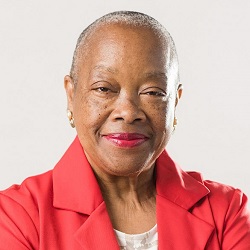Commentary on Deuteronomy 18:15-20
For the last two Sundays, the Hebrew lectionary texts have featured prophets, first Samuel, then Jonah — young persons and reluctant messengers.
We had to discern their effectiveness by what they said and did. We learned that as Samuel grew, “the LORD was with him and let none of his words fall to the ground,” the writer’s way of telling us that he was completely accurate (1 Samuel 3:19). From Jonah, we watched the fruit of his actions, as the people of Nineveh repented and God relented from destroying them. Thus, the prophet’s words make the difference (Jonah 3:10). According to these words in Deuteronomy, then, both Samuel and Jonah were “true prophets.” That’s easy enough to see.
As Moses describes the kind of prophet (one like him) that God sanctions, he anticipates their question: “You may say to yourself, ‘How can we recognize a word that the LORD has not spoken?’ “If a prophet speaks in the name of the LORD but the thing does not take place or prove true, it is a word that the LORD has not spoken. The prophet has spoken it presumptuously; do not be frightened by it” (Deuteronomy 18:21-23). But I am reminded of a saying I have heard from Rev. Dr. Yvette Flunder, the bishop of the Fellowship of Affirming Ministries. She often says: “The difference between a heretic and a prophet is time.” By this, she means that some things take time for us to know whether someone was telling the truth about the world, about God, about human nature. The Old Testament prophets were sometimes ridiculed as “mad men” or as people who only bore bad news (see Hosea 9:7 and Jeremiah 20:10). So, the question remains for us is, how shall we know?
It’s easy enough to revile and ignore people like Harold Camping, who “prophesied the end of the world on a specific date several times.1 Or to dismiss people from Westboro Baptist Church in Kansas as hurtful in ways God never intends and irrelevant to God’s work in the world. But to be saddened by people who rejoice in the current president naming Jerusalem the capital of Israel because they believe it is the beginning of fulfilling prophecy of Jesus’ return?2 Are there other, subtler, sayings among us that might ring true (or false), but only time will tell?
We must not forget that the text before us is not just instructions for Israel to live in a socially closed community that does not mingle with the cultures around it, but it also is a polemic against other religious traditions. As they prepare to “come into the land” God promises them, they are admonished they “must not learn to imitate the abhorrent practices of those nations” (Deuteronomy 18:9). We might remember that the writers of Deuteronomy are looking backwards on what actually happened as Israel acclimated itself to its neighbors (some scholars would say, as they who were already in Canaan grew into a distinctive tradition).
They were accused of passing their children through fire as a sacrifice (Deuteronomy 18:9; Ezekiel 20:31). Prophets accused them of practicing divination (1 Samuel 15:23; Jeremiah 14:14; Ezekiel 13:23; and one of the most significant recitation at 2 Kings 17, which lists several of the prohibitions in Deuteronomy 18, and which explains the end of Israel as a nation-state). But the very presence of those texts intimate that the people did not reject other ways of knowing God. Early in the kingship, Saul consults “the medium at Endor” (1 Samuel 28:7), and she accurately practices necromancy, even though the text says Saul had expelled all such spiritual leaders from the land (1 Samuel 28:3). What they ultimately are told is, not that such alternative religious practices are not efficacious, but that Israel is not permitted to use these practices, “although these nations…do give heed to soothsayers and diviners” (Deuteronomy 18:14).
When I visited Bahia in northern Brazil with a group of North American scholars on a study trip, a priestess of Candomblé told the scholars gathered two things: 1) In Brazil, when people receive the spiritual baths, the traditional offering for cleansing, “everyone is Candomblé on December 31.” She noted that even their more vitriolic opponents come to the temples to receive the potions for the bath. And she told us 2) that evangelicals were trying to destroy this tradition, that grew up during slavery and colonization as a hybrid of Catholicism and indigenous African spirituality, as a way for black people to survive the horrors of slavery. Prophecy, for her and others in that context, did not involve dismissing augury, signs, or divination. As we read these texts and prepare to preach them, we must think about the brutality with which they have been read around the world as colonizing forces used Christianity as an imperialistic tool to destroy whole cultures.
What today’s text reminds us is religiosity has been hybrid for centuries for God’s people, and we must figure out what calling people to a genuine faith means, as well as who speaks for God. In Deuteronomy, the person is a “prophet like Moses,” and reading his story, we know how flawed he was. Such news is good news because it makes each of us eligible to speak accurately on behalf of God. Moses once declared that he wished all God’s people were prophets (Numbers 11:29). Maybe we don’t have to be afraid of the random word, or even try to figure out whether it’s true or false. Perhaps discerning the way means watching over our own words and doing our best to speak rightly about God. Would that all God’s people were prophets, like Moses!
Notes:
- “Radio Preacher Who Predicted Doomsday Dies,” http://religion.blogs.cnn.com/2013/12/17/radio-preacher-who-predicted-doomsday-dies/.
- Diana Butler Bass, “For Many Evangelicals, Jerusalem is About Prophecy, not Politics,” http://www.cnn.com/2017/12/08/opinions/jerusalem-israel-evangelicals-end-times-butler-bass-opinion/index.html.


January 28, 2018